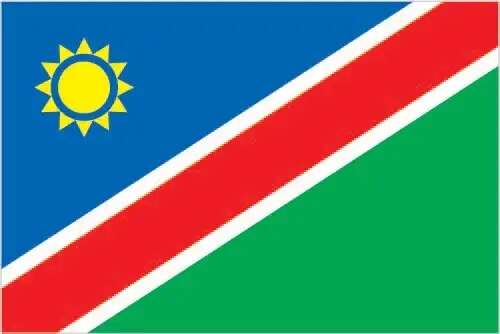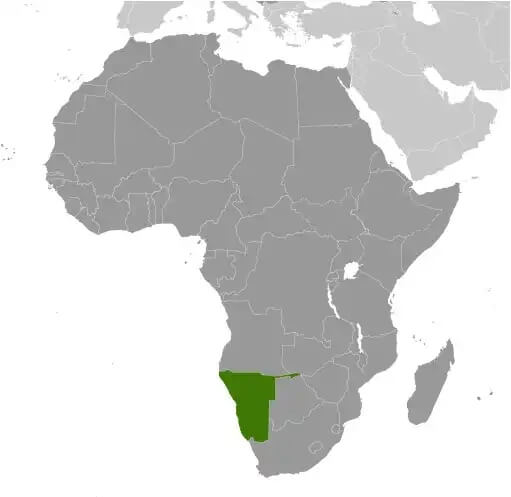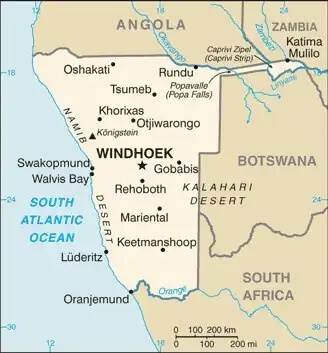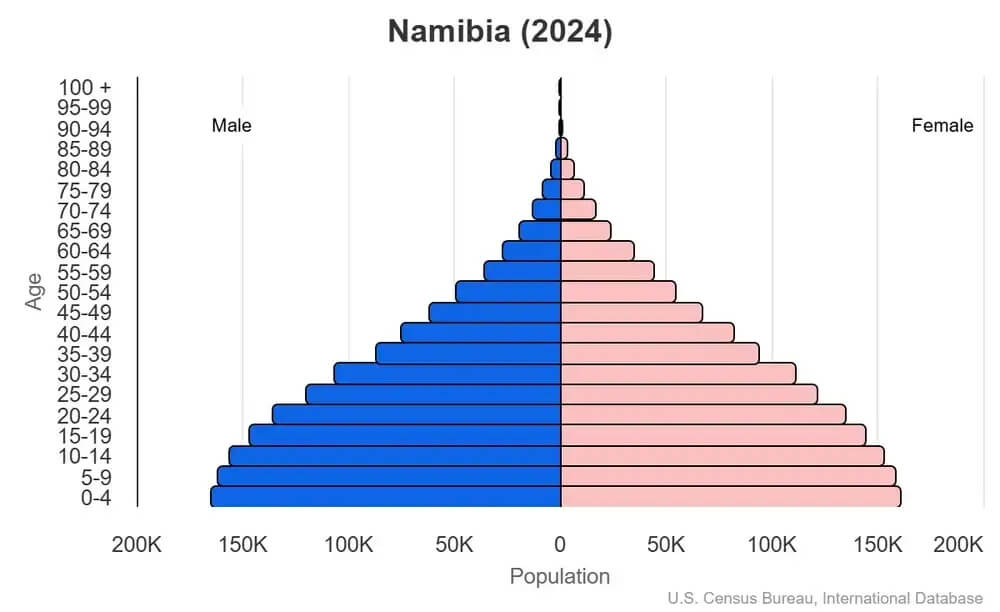World Book
Namibia
World Book Index
57


With a score of 57, the country is ranked 108th out of 158 countries in the World Book ranking. (more information)
Introduction
South Africa occupied modern-day Namibia, then known as German South West Africa, in 1915 during World War I and administered it as a mandate until after World War II. In 1966, the Marxist South-West Africa People's Organization (SWAPO) guerrilla group launched a war of independence for the area that became Namibia. Namibia gained independence in 1990, and SWAPO has governed it since, though the party has dropped much of its Marxist ideology.
Neighboring countries
Angola - Botswana - South Africa - Zambia
Geography
Area
total: 824,292 sq km
land: 823,290 sq km
water: 1,002 sq km
Climate
desert; hot, dry; rainfall sparse and erratic
Natural resources
diamonds, copper, uranium, gold, silver, lead, tin, lithium, cadmium, tungsten, zinc, salt, hydropower, fish
People and Society
Population
total: 2,803,660 (2024 est.)
Ethnic groups
Ovambo 50%, Kavangos 9%, Herero 7%, Damara 7%, mixed European and African ancestry 6.5%, European 6%, Nama 5%, Caprivian 4%, San 3%, Baster 2%, Tswana 0.5%
Languages
Oshiwambo languages 49.7%, Nama/Damara 11%, Kavango languages 10.4%, Afrikaans 9.4%, Herero languages 9.2%, Zambezi languages 4.9%, English (official) 2.3%, other African languages 1.5%, other European languages 0.7%, other 1% (2016 est.)
Religions
Christian 97.5%, other 0.6% (includes Muslim, Baha'i, Jewish, Buddhist), unaffiliated 1.9% (2020 est.)
Population growth rate
1.72% (2024 est.)
Government
Government type
presidential republic
Capital
name: Windhoek
Executive branch
chief of state: President Netumbo Nandi-NDAITWAH (since 21 March 2025)
head of government: President Netumbo Nandi-NDAITWAH (since 21 March 2025)
Diplomatic representation in the US
chief of mission: Ambassador Margareth Natalie MENSAH-WILLIAMS (since 18 January 2021)
Diplomatic representation from the US
chief of mission: Ambassador (vacant); Chargé d’Affaires Brandon HUDSPETH (since 1 January 2025)
Economy
Economic overview
upper middle-income, export-driven Sub-Saharan economy; natural resource rich; Walvis Bay port expansion for trade; high potential for renewable power generation and energy independence; major nature-based tourist locale; natural resource rich; shortage of skilled labor
Real GDP (purchasing power parity)
$31.154 billion (2024 est.)
$30.039 billion (2023 est.)
$28.761 billion (2022 est.)
Real GDP per capita
$10,300 (2024 est.)
$10,100 (2023 est.)
$10,000 (2022 est.)
Exports
$5.887 billion (2024 est.)
$5.729 billion (2023 est.)
$5.361 billion (2022 est.)
Exports - partners
South Africa 27%, China 12%, Botswana 8%, Belgium 7%, France 5% (2023)
Exports - commodities
gold, diamonds, radioactive chemicals, fish, refined petroleum (2023)
Imports
$9.199 billion (2024 est.)
$8.443 billion (2023 est.)
$7.43 billion (2022 est.)
Imports - partners
South Africa 36%, China 9%, India 7%, UAE 4%, USA 3% (2023)
Imports - commodities
refined petroleum, copper ore, ships, electricity, trucks (2023)
Human Development Index
The country's Human Development Index (HDI) is 0.665, ranking it 136th out of 193 countries tested. (more information)
World Happiness Report
The World Happiness Report ranked the country 113rd out of 158 countries tested with a score of 4.795. (more information)



